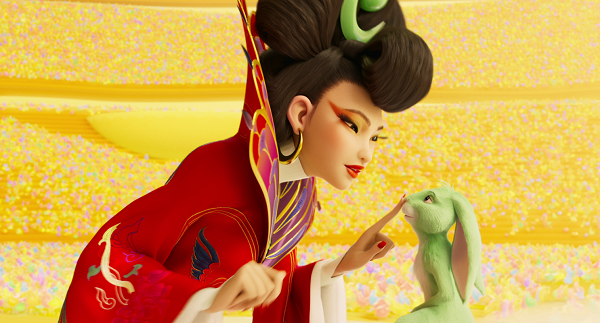Second only to Chinese New Year, the Mid-Autumn Festival is an important holiday in Chinese culture. Also known as the Moon Festival, it is a celebration of the end of the harvest. Under the full moon, families gather, enjoy the company of each other, and eat mooncakes together. Offerings are made to Chang’e, the immortal Moon goddess.
In Over the Moon, Fei Fei truly believes in the legend of Chang’e that her mother told her when she was young. Every year, her family makes mooncakes for the entire village for the Moon Festival. When Fei Fei is ten years old, her mother gets very sick and passes away. Four years later, Fei Fei is shocked by the news of her father’s engagement to Ms. Zhong. She also finds Chin, Ms. Zhong’s son, extremely annoying. Fei Fei thinks that her father has forgotten about her mother when he dismisses Chang’e, so she is determined to prove that Chang’e is real. She decides to build a rocket to travel to the moon. Chin stows away on Fei Fei’s rocket, throwing all her calculations off. They are rescued by spirits that take them to Lunaria, the kingdom of Chang’e on the dark side of the moon.
I wasn’t sure what to expect from this movie and it wasn’t even close to anything that I could have predicted. I was slightly disappointed that this movie was released October 23, 2020 when the Mid-Autumn Festival was on October 1st. But better late than never! This film is dedicated to the screenwriter, Audrey Wells. Sadly, she passed away due to cancer before Over the Moon was released. The film’s major themes of overcoming grief and allowing new people into lives may be Wells’ personal message to her family.
The story of Chang’e in Over the Moon is a different version than the one that I am most familiar with. This I did expect, since legends and folklore always have several variations. I was very happy to see that the Jade Rabbit was also in Lunaria with Chang’e, brewing away as usual. It was nice to see the mooncake making process and the family gathering to celebrate. The ping-pong match between Chang’e and Chin was an enjoyable scene showcasing an important sport in Chinese culture.
Lunaria is so bright and over-the-top, which I definitely wasn’t expecting. All the colors were quite distracting, paralleling both Chang’e and Fei Fei hiding their true feelings. I was glad that the typical panda sidekick was not in the movie. Instead, there was Gobi, voiced by Ken Jeong, who assisted Fei Fei in her search for Chang’e’s gift. I had no idea what creature Gobi was supposed to be. Even after he introduced himself as a pangolin, I had to look it up. In case you don’t know, a pangolin is a scaly anteater. Its meat and scales are used in Chinese medicine.
I was looking forward to the music! Chang’e is voiced by Phillipa Soo, the original Eliza in the Broadway phenomenon Hamilton. Her solo song in Over the Moon was very different. “Ultraluminary” felt very much like a K-pop song. I adored Chang’e’s duet Houyi. Fei Fei and Gobi’s “Wonderful” definitely tugs at the heart strings too.
In the end, I feel that the film does portray Chang’e and her story accurately. It illustrates the importance of the goddess of the Moon and justifies the Mid-Autumn Festival. While some parts of Over the Moon felt a bit outlandish and far-fetched, the overall message is heart-warming.
—
Here is an image of Chang’e dressed in a traditional red qipao (Chinese dress) chatting with the Jade Rabbit.
